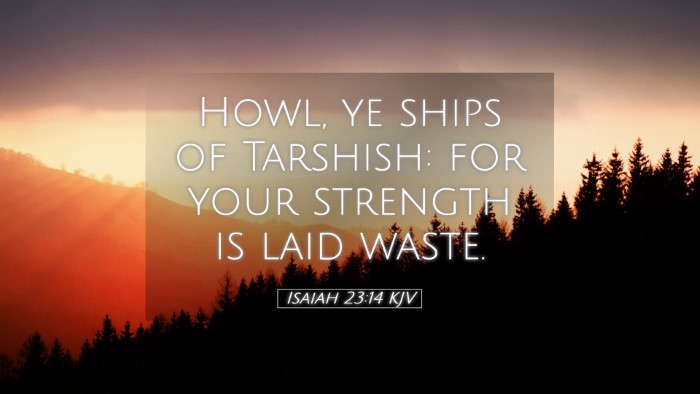Commentary on Isaiah 23:14
"Wail, O ships of Tarshish: for your strength is laid waste."
Isaiah 23:14 - KJV
Introduction
The prophetic writings of Isaiah are rich with themes of judgment, hope, and restoration. In Isaiah 23, the specific context revolves around the prophecy concerning Tyre, a prominent maritime city that symbolizes wealth and trade. This verse, Isaiah 23:14, starkly illustrates the impending doom that awaits this powerful port, particularly its commercial vessels. Here, we shall summarize insights derived from esteemed public domain Biblical commentaries, focusing on three major contributors: Matthew Henry, Albert Barnes, and Adam Clarke.
Contextual Analysis
Before delving into verse 14, it is essential to understand the broader context of the chapter. Isaiah prophesies against Tyre, a hub of merchant activity and prosperity, which has come to symbolize not just trade but also spiritual decadence and reliance on earthly wealth.
According to Matthew Henry, this chapter serves as a warning to the nations that pride themselves on their material success. Tyre’s downfall acts as a reminder that no earthly power can withstand God’s sovereign will.
The Call to Mourning - "Wail, O ships of Tarshish"
Henry notes that the ships of Tarshish were synonymous with the most significant maritime trade ventures of the time. When the prophet commands them to "wail," it reflects an emotional response to the utter ruin they are to experience. The echoing lamentation signifies loss—not just of material goods but also of the livelihoods and aspirations tied to these enterprises.
Albert Barnes elaborates that the economic implications of Tyre's destruction would resonate far beyond its borders, affecting trade networks across the Mediterranean. The lamentation of the vessels points to a collective mourning for lost commerce and the potential for social upheaval that could follow.
The Reason for Mourning - "For your strength is laid waste"
The phrase "for your strength is laid waste" signifies the futility of relying on human power and resources. Adam Clarke emphasizes that this reflects not only physical destruction but also spiritual loss. The ships, representative of Tyre’s wealth and security, are reminded of their vulnerability when faced with divine judgment.
Moreover, Clarke suggests that this statement serves as an indictment against those who place their trust in materialism. The "strength" of the ships could be seen as not just their cargo but their capacity to represent wealth, status, and independence.
Theological Implications
The broader theological themes present in this verse can be distilled into several key areas:
- Divine Judgment: The passage signifies that God's judgment can swiftly dismantle human pride and aspirations.
- Hope in Restoration: While the lamentation is profound, the overarching narrative of Isaiah ultimately leads toward restoration and hope.
- The Fragility of Human Power: This verse acts as a reminder to both contemporary believers and leaders that reliance on earthly strength is transient.
Practical Applications for Contemporary Believers
For pastors, students, and theologians, Isaiah 23:14 serves as a poignant reminder of the dangers inherent in misplaced priorities. The following applications are drawn from the insights of the aforementioned commentaries:
- Encouragement for Humility: The text encourages believers to approach life with humility, recognizing that God is the true source of strength.
- Critique of Materialism: It challenges individuals to examine their reliance on material possessions and success while nurturing a deeper spiritual connection.
- Awareness of Divine Sovereignty: A reminder that God’s will prevails over human plans, prompting believers to remain vigilant in faith.
Conclusion
In summary, Isaiah 23:14 serves as a profound warning against the dangers of pride and materialism through the lamentation of the ships of Tarshish for their "strength laid waste." The insights provided by Matthew Henry, Albert Barnes, and Adam Clarke illustrate the significant implications of divine judgment, human fragility, and the call to humble reliance on God. In a world increasingly drawn toward material wealth and success, this prophetic message offers timeless wisdom for all who seek to align themselves with divine truths.


